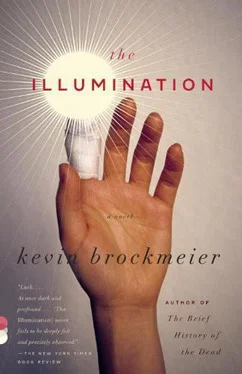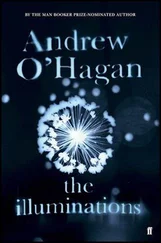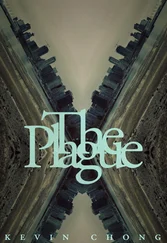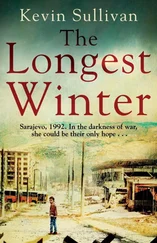Chuck’s duty, he believed, was to watch over it all. He was big, strong, noble—the Superman of lifeless objects. Objects did not understand how dangerous the world could be. They were simple, childlike, and they could not protect themselves. He hated to see them hurt, hated it beyond words. And that was why he had to steal the book.
It belonged to the man who lived down the street. According to Chuck’s parents, he had undergone a terrible accident. One rainy day his car had slid into a pillar. He survived the crash, barely, but his wife did not. Afterward, he spent a whole month recovering in the hospital. He came home oozing light from his knees and stomach. He was like a thin white skeleton on his crutches. “The poor son of a bitch,” Chuck’s pretend dad said.
One night Chuck noticed the man carrying a book inside. The book ached with the hard light of something broken. Chuck could see its unhappiness melting straight through the covers. It was like a little sun shining across the street. The man walked past a window into his living room. Then he stopped and sat down and the light vanished. The next day, Chuck decided to get a closer look. He waited until his parents were arguing and went outside. The sky was the watery blue of a robin’s egg. A dragonfly landed on the rim of a Coke bottle. The bottle captured the sunlight, firing it into the air. It was an afternoon for coasting downhill on a bicycle.
Chuck looked both ways, paused, and ran across the street. He followed the stepping-stones through the man’s front yard. He slipped sideways through the bendy twigs of his bushes. Then he pressed his forehead to the wide cool window. He spotted the book right away, sitting on a table. Its pages were a thick stack of brilliantly glowing squares. The whole house shimmered, but the book was something special. Chuck wished he could tell what was wrong with it.
Later, at home, he could not stop thinking about it. His curiosity grew stronger and stronger as the day passed. Eventually, he returned to the window to look at it. The next day, and the next, he went there again. He began living behind the bushes as often as possible. He lived there secretly, usually in ten- or fifteen-minute stretches. Week by week, the book shone with its secret pain. Chuck was amazed it didn’t set the table on fire. Every so often, the man drifted past like a sailboat. Twice he caught Chuck standing outside peeking in at him. The first time, Chuck didn’t think he was even home. Suddenly he just appeared, walked over, and touched the glass. His fingers landed with a rat-a-tat-tat , and Chuck ran away.
The second time was a warm, dark, breezy midsummer night. Chuck watched the man shout at a group of teenagers. One of them, a girl, was living with the man. Chuck was almost completely sure she was not his daughter. She had glinting cigarette burns on her arms and legs. They looked like the holes in Swiss cheese, but silver. Once, outside walking, she had called Chuck her “main man.” She had mussed his hair and given him a Whatchamacallit. “Chin up, little guy,” she’d said, blowing him a kiss. That was a whole month before, minus a few days. Now the teenagers, the whole skinny crowd, left the house. The girl was the last of them to step outside. Afterward, the man sat on the couch, motionless, breathing hard. He was clutching the book shakily in his slender hands. When he spotted Chuck, he hurled it at the window. Light came whipping out of it in long white ribbons. As Chuck took flight, the bush’s twigs scraped his face.
That night, he lay in bed watching the scratches flicker. He kept picturing the book twisting wildly through the air. He wondered what it thought as its pages skittered open. Whether it imagined it was being punished for its mistakes. How it felt without a good solid table underneath it. If it believed the world would always be so frightening. Right then and there, he decided he would rescue it.
Another month went by before the chance came his way. He knew the man’s habits, and knew the girl’s, too. He had spent the summer watching them like a detective. They both left the house for several hours every afternoon. At night they usually ordered a pizza and watched TV. They slept late most mornings and ate leftovers for breakfast. The man took pictures of the girl with his camera. The girl posed with her arms crossed over her head. Occasionally she rubbed the man’s back through his polo shirt. She taught him how to use a knife against himself. Their bodies were both marked with hundreds of narrow cuts. The wounds covered their skin, every inch, in glittering ladders.
One day, shortly after two-thirty, Chuck snuck across the street. He was feeling courageous, invincible (which meant unbeatable, not see-through). He crept into place and waited behind the tall bushes. Around three, the sun turned the window into a mirror. The sight of Chuck’s eyes staring into themselves surprised him. He was blinking the image away when the man exited. The girl came with him and off they walked together. Neither of them noticed Chuck standing against the bricks, fortunately. After their footsteps faded away, he crept out of hiding. He took the spare key from beneath the fake rock. He opened the door—first one lock, then the other. The house smelled like bread dough mixed with tennis shoes. The floor was a glossy white with scattered black knots. Chuck made it a rule to tiptoe between the lines. He passed a table with a wooden clock on it. He turned a corner and went into the living room. The book was sandwiched between some magazines by the couch. The pages were buckled, the cover scuffed, the letters faded. When Chuck gripped it, his bones showed through his fingers.
Chuck bumped the table in the hallway as he left. The clock teetered and fell with an awful splintering noise. Immediately, it lit up inside, its pieces throbbing with pain. He wanted to hold it to his forehead and cry. But he was scared of getting caught there, scared crazy. He held the book to his chest and ran home. No matter how Chuck tried, he just kept hurting things. That was how the world worked—he couldn’t change it.
His mom was mixing cookies and burning a plain candle. A wax-and-sugar smell like birthday cakes hung in the air. Big important things always happened to Chuck on his birthday. On his second birthday, for instance, he finally started walking. On his seventh birthday, he got sick with chicken pox. He used to have a cat named Alley Cat Abra. On his fifth birthday, she was killed by a car. On his ninth birthday, Chuck decided he would stop talking. He never said anything right, so what was the use? He hadn’t spoken since, and it wasn’t— wasn’t —a phase. On his fifth birthday, he went to Chuck E. Cheese’s. Chuck E. Cheese shared Chuck’s name, which made them alike. Chuck decided he was his friend, his smiling buck-toothed friend. One was Chuck the Boy, the other Chuck the Mouse. Chuck the Mouse handed Chuck the Boy some gold tokens. Chuck the Boy followed Chuck the Mouse into the kitchen. Chuck the Mouse carried him back outside by the armpits. His giant head bobbed around like something inflated with helium. Later, Chuck the Boy got trapped inside the crawling tubes. His pretend dad yelled, “Climb the hell out!” at him. He coaxed him slowly through the maze, pointing and shouting. “To the car!” he demanded, and Chuck’s birthday was over.
Now he was ten: ten years and seven months old. His last birthday party was already a whole half-year ago. He thought about the presents his parents had given him. His favorite was the picture box with the multicolored pegs. His second favorite was the tic-tac-toe game with the beanbags. His least favorite was the robot with missiles for arms. He remembered kneeling on the dark green living room carpet. He remembered clapping his hands during “Happy Birthday to You.” Then his mom set down a cake with burning candles. “How does it feel to be another year old, Chuckie?”
Читать дальше












